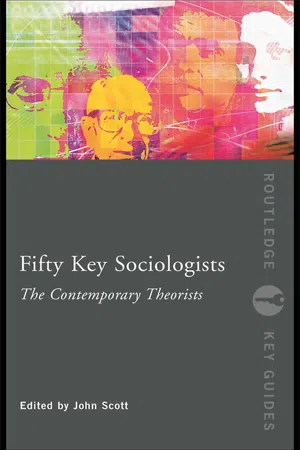Politics & International Relations
Ernest Gellner
Ernest Gellner was a prominent philosopher and social anthropologist known for his work on nationalism and modernity. He argued that nationalism is a product of industrialization and the rise of mass society, and that it plays a crucial role in shaping modern politics and culture. Gellner's ideas have had a significant impact on the study of nationalism and the dynamics of contemporary societies.
Written by Perlego with AI-assistance
Related key terms
2 Key excerpts on "Ernest Gellner"
- John Scott(Author)
- 2007(Publication Date)
- Routledge(Publisher)
Nations and Nationalism is built within this framework. Nationalism is to be understood in terms of the radical structural and cultural transformations associated with the development of industrial societies. Within such societies, social rank is assigned on the basis of occupational positions that are allocated on the basis of educational credentials. The sense of belonging increasingly derives not from membership of a particular village, lineage or corporate group, but from being part of a shared literate culture broadly co-extensive with the boundaries of the nation-state. Nationalism is rooted in the complex, ever-changing division of labour within an industrial society, which is serviced by a large and expensive education system providing standardized generic training. This ensures that all citizens share the same basic skills and understandings. It represents the victory of high culture over rival low cultures.Nationalism engenders nations, not vice versa, according to Gellner. Successful nationalist movements select and transform a pre-existing culture, working to ensure that this culture is fused with a single polity. People who, in the early phases of industrialization, find they are excluded and deprived may seize on whatever linguistic, genetic or cultural symbols they can as a way of marking themselves out as a people whose demands must be met. Sometimes a localized low culture may be used and sometimes a high culture: Arab nationalism draws on Islam, while some African nationalist movements have adapted European high culture to their own purposes.These processes perhaps stood out more clearly in the mind of a man such as Gellner who was familiar with many cultures and who declared that he had no faith and belonged to no community. All three of his key books illustrate Gellner’s capacity for building simple models of social systems and social processes and explaining them with clarity and wit. He used these skills to identify patterns and sequences on a vast historical scale, quite consciously placing himself in an Enlightenment tradition that includes both David Hume and Max Weber.See also in Fifty Key Sociologists: The Formative Theorists: Emile Durkheim, Max Weber.Major works
A full bibliography can be found at http://nienibers.tripod.com/Gellner-Page/Biblio.html .Thought and Change. 1964. London: Weidenfeld and Nicolson.Saints of the Atlas. 1969. London: Weidenfeld and Nicolson.Cause and Meaning in the Social Sciences. Essays of various dates. London: Routledge & Kegan Paul, 1973.Legitimation of Belief. 1975. Cambridge: Cambridge University Press.Spectacles and Predicaments; Essays in Social Theory. Various dates. Cambridge: Cambridge University Press, 1980.Muslim Society- eBook - ePub
Anthony Giddens
The Last Modernist
- Stjepan Mestrovic(Author)
- 2005(Publication Date)
- Routledge(Publisher)
5: GIDDENS'S POLITICAL SOCIOLOGY
—Arthur Schopenhauer ([1818] 1969b:357)Now senseless delusion, now intriguing politics, incite [humans] to wars with one another; then the sweat and blood of the great multitude must flow, to carry through the ideas of individuals, or to atone for their shortcomings…. The tumult is indescribable. But what is the ultimate aim of it all? To sustain ephemeral and harassed individuals through a short span of time.If, as I have suggested in chapter 4, Giddens's efforts to confront emotion and culture on a private and intimate level—through reading Freud and taking up feminism with the aim of constructing a modernist conceptualization of reflexive self-identity—seem brittle and frankly chauvinist, his efforts to confront emotion on a more collective level, through nationalism, are equally stiff and frankly authoritarian. If he tries to replace traditional emotion with modernist conviction regarding personal intimacy, he attempts to replace the concept of nationalism with the modernist notion of the nation-state. Consistent with his tendencies to amputate history and tradition from the present, he simply cannot fathom connections between the sentiments that animate the nation-state and traditional patriotism. And for all his tedious efforts to present the nation-state as an entity with clearly demarcated borders and surveillance, in the end, his thought comes across as obsolete. For example, the information revolution in general and the Internet in particular have made state borders seem old-fashioned: electronically mediated information travels across such borders as if they did not exist. But the underside of the modern nation-state is that old-fashioned nationalism has grown more, not less, powerful in contemporary times, such that nationalists around the world—who are better informed than our ancestors could have imagined, precisely because of the information revolution—no longer hold state borders as sacrosanct. Finally, the general drive toward national emancipation is constantly at loggerheads with the modernist desire to enshrine permanent state borders. These are among the tensions that characterize political life in contemporary times, which Giddens's modernist thought cannot grasp.
Learn about this page
Index pages curate the most relevant extracts from our library of academic textbooks. They’ve been created using an in-house natural language model (NLM), each adding context and meaning to key research topics.

